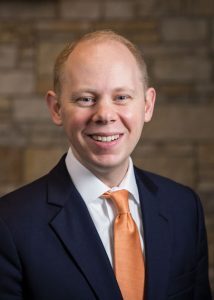From the President: Matthew A. Scogin ʼ02

Dear Friends and Family of Hope College,
Four years ago, about the time that I felt God calling me to apply to become president of the college, I was having dinner with a trusted friend in New York City. The ever-increasing cost of college education was on my mind. My friend, himself a proud graduate of another Christian college in the Midwest, said glibly, “Well, Hope College should do something really different. No one should have to pay for hope!”
We chuckled. It was a preposterous idea. But it was also a profound truth.
The hope we have in Christ is a gift – all grace – there is no possible way we can pay for it or earn it.
A few weeks later, I was taking a late flight back home after a business trip. As I dozed off, the pilot’s voice came over the intercom: “We’re now at cruising altitude, 33,000 feet.” That was nearly the same amount as Hope’s tuition at the time. As the plane descended into John F. Kennedy Airport, and the altitude dropped from 33,000 feet to zero, I saw it. I envisioned the tuition graph in my mind, taking the same trajectory, from $33,000 to $0.
We’re excited to share in this issue how we’re going to do just that. To be clear, this is not “free tuition”. Students will still pay. However, instead of asking students to pay a lot of money – at the poorest point of their lives – before they’ve received any benefits of their transformational Hope education, we are imagining a funding model where students pay through gifts after graduation, We’re calling the initiative Hope Forward, and we believe it’s a game-changer for higher education.
The approach aligns perfectly with Hope’s mission. It makes a Hope education accessible to every student regardless of ability to pay. It empowers our graduates to pursue positive impact in the world, because after all, the core message of the Christian gospel is: You are covered; now go and live differently. It also fosters a culture of generosity and gratitude. And it invites students into a learning community, moving away from what too often feels like a transactional relationship.
This is a long-term project, but we’ve started the journey. The first students enrolled through the pilot program will arrive this fall, and our ambition is that eventually Hope Forward will support every student.
For that to work, though, we need a lot of help — we need you! Please read the story in this issue, visit Hope online at hope.edu/forward for more information, and imagine with us what is possible.
Spera in Deo,
Matthew A. Scogin ʼ02
President
